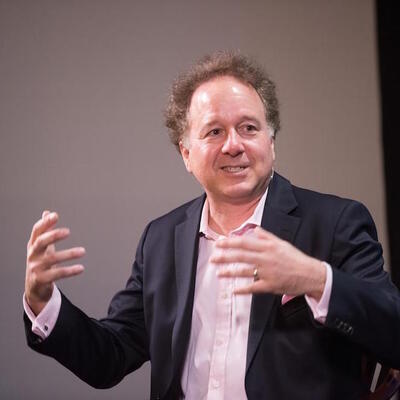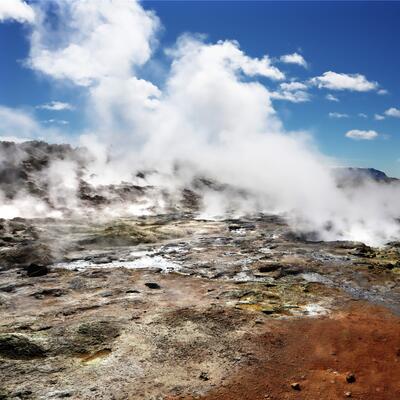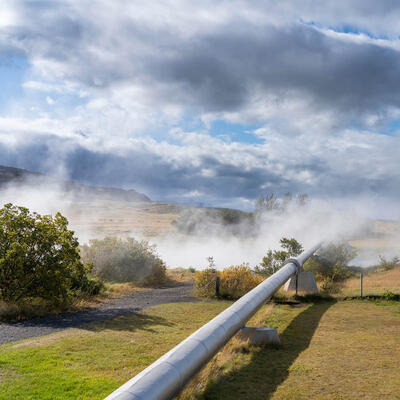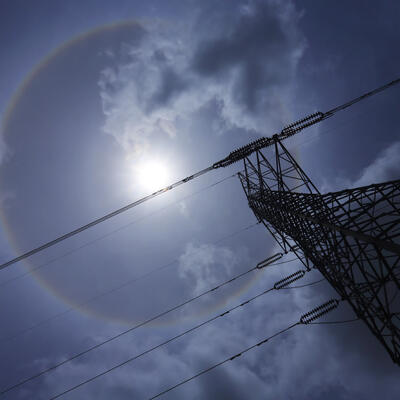
Geoengineering: Who Should Control Our Atmosphere?
Guests
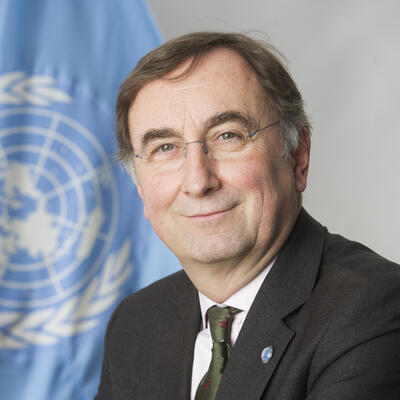
Janos Pasztor
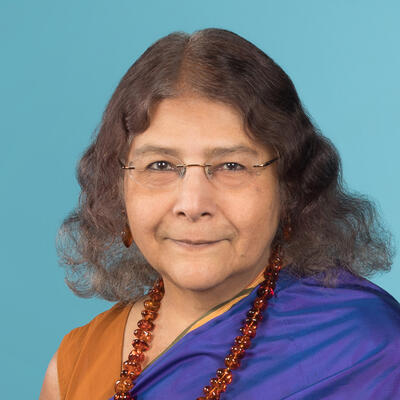
Sheila Jasanoff
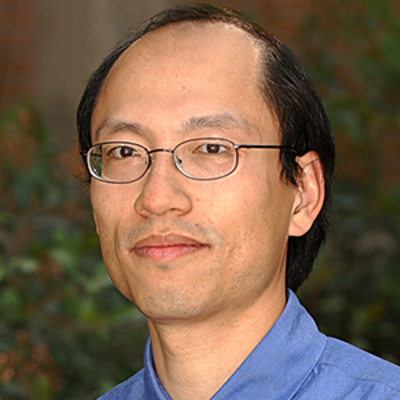
Albert Lin
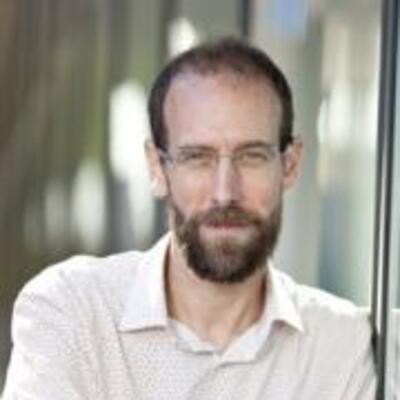
David Keith
Summary
Solar geoengineering – such as putting sulfate aerosols into the stratosphere to reduce the amount of the sun’s heat from reaching the earth – could provide an emergency brake on the disruptive and deadly effects of carbon emissions. But the subject is full of complex, difficult questions about research, politics and global governance.
“Some of it is about fundamental ethical questions about what sort of interventions that humans should be doing in the climate. Some of it is about intergenerational equity obligations that we might be imposing on future generations if we do solar geoengineering or if we don't do solar geoengineering,” says Albert Lin, a law professor at the University of California Davis. Then there’s the question of “who controls the thermostat, or should anyone control the thermostat and who should make decisions on behalf of the entire global population?”
Lin says exploring these questions can provide policymakers with necessary knowledge about how to proceed, such as whether and how we should even research solar geoengineering or its deployment.
Some think even the idea of such a technological gambit is highly problematic.
“One of the things that again puzzles and bothers me from a normative standpoint, is why the research necessarily is about reengineering the earth instead of reengineering habits on a communitywide level of how to reduce the emissions in the first place,” says Sheila Jasanoff, professor of science and technology studies at Harvard.
She also points to accountability concerns when research dollars come from private sources.
“Wealthy people are not subject to the same kinds of correctives that a government is subject to. And funding just reflects that same lack of accountability now bumped into the knowledge-making process. And that is, I think, profoundly problematic for the world,” Jasanoff says.
The global governance issues are particularly complex, says Janos Pasztor, executive director of the Carnegie Climate Governance Initiative.
“There is no understanding at the international level, or for that matter, within countries, of what is right and what is wrong in terms of using or not this technology. And so, there is fear of even talking about it, let alone figuring out how to decide and where to decide and whose information to use and all that,” he says. Pasztor says global fora like parts of the United Nations or global summits like G7 or G20 can be avenues for discussion and establishing common practices.
But he cautions that solar geoengineering should not be considered a solution to the climate crisis. “The solution to the climate crisis is reducing emissions through transformative changes to our behavior, our economies and everything else.”
This program was underwritten in part by the Laney and Pasha Thornton Foundation.
Resources From This Episode (3)
Full Transcript
Greg: This is Climate One. I’m Greg Dalton. Solar geoengineering could provide an emergency brake on the disruptive and deadly effects of carbon emissions.
Janos Pasztor: We don't know enough yet, but it is potentially, clearly one of the tools. So, the question then is for society to figure out do we want to do this or not? Would the world be better off or worse off were we to make use of this technique? (:13)
Greg: But the subject is full of complex, difficult questions about research, politics and global governance.
Albert Lin: The question of who controls the thermostat or should anyone control the thermostat and who should make decisions on behalf of the entire global population. (:09)
Greg: Some think even the idea of such a technological gambit is highly problematic.
Sheila Jasonoff: One of the things that again puzzles and bothers me from a normative standpoint, is why the research necessarily is about reengineering the earth instead of reengineering habits on a communitywide level of how to reduce the emissions in the first place.
Greg: Who should control our skies? Up next on Climate One.
Greg: Should humans alter the atmosphere to lower the earth’s temperature? This is Climate One. I’m Greg Dalton.
Greg: Before we get into today’s topic of solar geoengineering, we want to acknowledge the international climate conference currently taking place. With COP26 now underway in Glasgow, there’s anticipation around whether countries will inject new momentum and ambition into the Paris climate agreement. Our correspondent Aman Azhar reports…
PROGRAM PART 1
Aman Azhar: When Beijing announced President Xi would not be coming to Glasgow, some commentators saw it as a setback to the UK-brokered climate summit. Others saw it as a sign of the growing geo-political gulf between the U.S. and China. And now that COP26 is underway, the overriding question seems to be whether the national self-interests of these powerful countries will trump the collective interest of all nations in mitigating climate change.
Navroz Dubash: Broader geopolitical alliances tend to be overriding factors on climate politics. We saw around the time of Paris, that a bilateral deal between the US and China really opened the door to an agreement. And once the big two agreed everybody more or less, had to get into line. We don't look like we have a similar moment here.
Aman Azhar: That’s Navroz Dubash—professor at the Centre for policy Research in New Delhi, India. He tracks the geo-political competition between world powers that’s playing into COP this time around.
Navroz Dubash: US and China are at loggerheads. The EU and the UK are trying various diplomatic efforts, but maybe don't have enough heft to move the needle by themselves. Then you have countries like India, that, in a sense, have become relatively speaking, more progressive on climate change, but that's partly because our competitor countries Brazil and Bolsonaro, Australia and Scott Morris have all kind of moved backwards.
Aman Azhar: Even so, Helen Mountford, vice president for climate and economics at the World Resources Institute, says major world economies including the US, China and India do have reasons to cooperate.
Helen Mountford: They have governments in place who actually understand these risks and recognize the importance of action. In fact, all three have some of the cities that are most at risk both in terms of population and in terms of assets, most at risk from sea level rise. So, it is in their interest to move forward. And they know that individually they cannot tackle it alone. At the same time, there's a lot of geopolitical challenges now and each of them will be going in with their own particular interests in mind.
Aman Azhar: But it is precisely in times of discord when global leaders are expected to demonstrate their mettle and live up to peoples’ expectations while safeguarding their national interests, particularly in terms of sustainable growth. Can President Biden, President Xi and India’s prime minister Modi provide that leadership at COP26, even if not all three are in attendance?
Navroz Dubash: I think there is increasingly a sense at the leadership level, that climate change is going to be the biggest test of international cooperation. But it will still be subservient to narrower short-term questions of competitiveness. Which is why the narrative of green growth, the story that we can do well, by being green, that story is a really important story. But we don't really see the amount of money flowing in that direction. That is necessary for that to become a vision of the future.
Aman Azhar: To Helen Mountford, it’s not only about powerful figureheads but the political systems that empower them and set limits on those powers.
Helen Mountford: It's not just an individual who can make all the decisions. In China, you have the People's Congress, which is very influential, you'll have various different parties. And again, even in other countries, like in Europe, we've seen recently both in Germany and the Netherlands, where the government's made decisions and put in place plans on climate action, and then were taken to court. So, you have always this different balance of powers which can actually influence the decisions and change them.
Aman Azhar: Given these complex geo-economic sensitivities and political nuances, and the ongoing pandemic, can COP26 getbring major economies to agree on tackling the climate challenge to the degree required?
Helen Mountford: We are expecting U.S., China and India will all be moving forward on climate ambition. Will they be doing enough? Probably not. Then it will be very difficult to keep global warming to the levels that scientists say we should.
Aman Azhar: There’s been a hope for a while that climate change will become a rallying point for the world nations to unite against a common threat to humanity. By the time COP winds down, we will know if that hope has reason to live another day. For Climate One in Washington DC, this is Aman Azhar.
Greg: Solar geoengineering, also called solar radiation modification, is a complicated and contentious topic. To get a grounding in the basics, Climate One’s Ariana Brocious spoke with David Keith, a professor of applied physics and public policy at Harvard, who led the development of Harvard's Solar Geoengineering Research Program.
Ariana Brocious: David, can you help us understand the basics of what solar geoengineering is, how it works and what it's intended purpose is.
David Keith: Solar geoengineering is the idea that humans might deliberately intervene in the Earth's system, most obviously to reduce the amount of energy the Earth absorbs from the sun, by making the Earth a little bit more reflective, say by putting aerosols in the stratosphere where they would reflect back maybe half a percent of incoming sunlight. And the idea is that would bring the Earth a little bit closer into energy balance, compensating some of the effect of greenhouse gases which tends to make it harder for the Earth to radiate away heat. Solar geoengineering is an idea of using scientific knowledge and technology to achieve something. In that sense it's engineering in the form of applied sciences. And that idea is old, it basically arose at the same time as the modern concerns about climate arose in the mid-1960s.
Ariana Brocious: You're saying it's taking knowledge we already have, understandings we've had for a while but applying them in a new way?
David Keith: Yeah, so of course nobody's doing solar geoengineering now, people are studying it, both the science and technology but also the government, but I think it's crucial to say this isn't something that is a completely new invention. It's really simply the idea of applying existing scientific and technological knowledge. So while there's been relatively little research, because in some sense there's been a taboo or fear of doing research, there's actually a deep basis of knowledge that comes because these methods are intimately tied to the existing knowledge we have of Earth and atmospheric sciences. Of the way the Earth's systems respond to aerosols or other changes.
Ariana Brocious: So could you quickly explain what are the most prominent methods being explored under solar geoengineering?
David Keith: There's a big range of ways that solar geoengineering might be achieved. From building structures in outer space which might block some sunlight which seems kind of ridiculous but this is a 100 or 200 year problem and may not be later in the century, to aerosols in the upper atmosphere to changing some kinds of cirrus clouds to making lower clouds more reflective or making the surface more reflective. I think it's pretty clear that the version that is best understood and has been most studied is the idea of adding aerosols to the stratosphere, say 20 km over our head, twice as high as a regular aircraft flies.
Ariana Brocious: What has the research that's been done to date shown about how effective some of these techniques could be? How much of a temperature reduction, say, might we achieve with putting aerosols into the stratosphere?
David Keith: It's natural to ask, as you just did, how much we can reduce the temperature. But that really is the wrong question. Temperature is a proxy, a political proxy if you like, for all the local climate harms that actually hurt people and ecosystems. I mean the one thing we're actually sure about for solar geoengineering is that it can reduce global average temperature. But there are ways that you might reduce global average temperature and still have horrible effects so it would be senseless to do it. So the question is not, can it or can it not reduce global temperature. It’s, can it reduce climate hazards that most drive human and ecological impacts and do it in a way that’s relatively evenhanded without making some areas significantly worse off. That's the question we don't yet know the answer to. I've found the research results from climate models over the last decade or two on this technology to be very surprising, in the sense that I and other people confidently said that solar geoengineering could not produce relatively uniform reductions in many of the key climate hazards. And it would inevitably make some regions much worse off. And in fact the results from models seem to show that it is possible to do this in a way that's more even-handed and that reduces many of the key climate hazards, not just temperature.
Ariana Brocious: You touched on this being a difficult subject to research. Can you explain why that is and why there is resistance to the concept in general from different camps?
David Keith: Well I'm in favor of doing research on these technologies and so I'm probably not the best spokesman for people who oppose research, but as best I understand I think the deepest concerns come from a political judgement that however these technologies actually work, they are almost certain to be misused, misused to allow the powerful to extend their power over the weak, or misused as an excuse to avoid the emissions cuts that we must do.
Ariana Brocious: You recently wrote an op-ed in the New York Times explaining some of where the science stands and the feasibility of using solar geoengineering in the future. And I'm curious if you think as we move into the next few decades, trying to dramatically reduce our carbon emissions and find some ways to capture carbon that's already in the atmosphere, do you think we will need to employ solar geoengineering?
David Keith: So I think the "we will need to" is a deep cop out. It's very tempting to say "we," but the reality is the world has 7 billion people or so with different opinions, organized politically differently and some people who will be most affected by our actions aren't alive yet. So there really is no single "we" and I think that the idea that there's a need, that we just objectively have to do x or y is really false. These are fundamentally political choices. Choices about how we want to balance the future harms of our carbon emissions or solar geoengineering against benefits and risks. Really I've been deeply trained not to buy the framing that we need to do x." That's just not the way complicated issues at the science/policy interface like this work.
Ariana Brocious: David Keith is a professor of applied physics and public policy at Harvard, and led the development of Harvard's Solar Geoengineering Research Program. Thanks for being on Climate One, David.
David Keith: Thank you very much.
Greg: Earlier this year, a solar geoengineering project led by a different group at Harvard planned to test a balloon flight above Sweden. When the local indigenous Saami people learned of the test planned in their homeland, they opposed it -- because of opposition to the concept itself and because they had not been consulted beforehand.
Greg: In a June panel discussion about the risks of solar geoengineering led by the Center for International Environmental Law, the vice president of the Saami Council, Åsa Larsson-Blind, spoke about her people’s opposition.
Åsa Larsson-Blind: When we learned what the idea of solar geoengineering is and what they are attempting to do, we reacted instinctively because this goes against our worldview, that we as humans should live and adapt to nature. It goes against the respect with which we taught to treat mother nature and earth. And it’s the whole idea that the line of thought that has put us actually in the climate crisis in the first place should also be the one thing taking us out of it. There our position is clear, that now is the time for all society to listen to what mother earth is telling us, and what nature is telling us. We need to take a step back now and our focus should be on finding a way to a sustainable climate-friendly society.
Greg: After the Saami people sent letters to Harvard researchers and Swedish officials, that test was suspended. Researchers say they will seek “robust public engagement in Sweden that is broadly inclusive of indigenous populations” before moving ahead. Harvard’s David Keith declined to discuss the experiment.
Greg: Coming up, we explore the complexities of solar geoengineering research and governance.
Janos Pasztor: When it comes to modifying the solar radiation balance of the earth, you're talking about impacting just about everything. So, one has to look at the totality and the interrelationships between these different issues.
Greg: That’s up next, when Climate One continues.
Greg: This is Climate One. I’m Greg Dalton, and we’re talking about the potential promise and pitfalls of solar geoengineering.
Greg: I invited three guests to discuss the issues of global governance, research, and moral questions around the technologies. Janos Pasztor is executive director of the Carnegie Climate Governance Initiative and a former UN Assistant Secretary-General for climate change. Sheila Jasanoff is a professor at the Harvard Kennedy School where she explores the role of science and technology in the law, politics and policy of modern democracies. Albert Lin is a law professor at the University of California Davis, where he specializes in environmental and natural resources.
Greg: Humans have unintentionally been tampering with the atmosphere by burning fossil fuels for more than 150 years. I asked Janos Pasztor how he thinks about whether or not humans should now intentionally tinker with the sky to temporarily slow global heating.
PROGRAM PART 2
Janos Pasztor: One has to look at the situation of the climate crisis today. And we know that the temperatures are still going up and the impacts are visible and feelable everywhere and something needs to be done about it. So, then the question is what tools do we have available in order to change that, to reduce the temperature and therefore reduce the impacts. And it seems the scientists are telling us that solar radiation modification could be one of these tools. So, the question then is for society to figure out do we want to do this or not? Would the world be better off or worse off were we to make use of this technique? And that is the real question and it’s not an easy question to answer.
Greg Dalton: Right. And we’ll get into a little bit like who makes that decision for the basis of the world. Sheila, let’s talk about the terms here because these terms geoengineering is a term that is widely recognized. We've heard solar radiation management, solar radiation modification. How things are labeled is really powerful, how they are framed, especially early in the stages of a technology that can have a long-lasting impact. So, how do you think about this solar engineering, and the language that’s used?
Sheila Jasanoff: I think that the first point you made about who makes the decisions applies equally to who sets the terms of the debate. In framing an issue, are we letting the scientists who are at the cutting edge of the research decide when a term is out of date and no longer can be used, and therefore we toss it and move on to something else. For one thing, I don’t think terminology works by getting rid of one term and putting another in its place. In all of the areas of science and technology I’m familiar with, it’s become more of a layer cake. So, there’s both a hubristic side and a humility side to the terminology. Hubristic in the sense that some people claim a better right to define the terms than other people, on what right do they claim that. The humility side is that just declaration that now henceforth it shall be called this will not necessarily achieve the results because the word’s out of the box it’s a little bit like genies, language is a genie in that sense.
Greg Dalton: Albert Lin, what concerns you most about the potential for solar radiation modification or solar geoengineering?
Albert Lin: Well, I mean there are so many issues surrounding this particular technology. Some of it is about fundamental ethical questions about what sort of interventions that humans should be doing in the climate. Some of it is about intergenerational equity obligations that we might be imposing on future generations if we do solar geoengineering or if we don't do solar geoengineering. Some of these questions are about, you know, the question of who controls the thermostat or should anyone control the thermostat and who should make decisions on behalf of the entire global population. So, there are so many difficult questions and these difficult questions, just in terms of, you know, how do we go forward in terms of developing knowledge that's useful to policymakers who will be confronted with these decisions about what do we do about this. Should we explore and do more research on solar geoengineering, let alone deployment which is far off in the future in terms of the technology it’s just not there today.
Greg Dalton: Well, let’s pick up on that political pressure because you can certainly see, certainly in certain parts of the US, perhaps elsewhere that, you know, when there's popular upset and pain, and misery and pressure, you know, government do something, you know, if this tool existed and some politician could break the glass and go use it. This tool doesn't exist now. Sheila, if that is tool existed is it more likely that political pressures will exist will generate in some democracy or some not democracy where they will be used?
Sheila Jasanoff: Greg, one puzzlement I have is this debate about whether the tool exists or not. One of the arguments that's being put forward in favor of solar radiation management is just how cheap it is. So, if you go back and just read the literature by the proponents they’ll talk about how little sulfur is needed to generate the aerosols, how existing airplane technologies are enough, how little would have to be spent, compared with the totality of the budget that people assume will need to be spent in order to get us back to some level of greenhouse gas emissions that the world needs in order to stay safe. If indeed one of the big pluses for solar radiation management is that it's relatively cheap, relatively easy to use and in relatively abundant supply, then of course people will use it to their advantage. Why not? I mean, ultimately politicians are making decisions and they are accountable to their own people and their own constituencies, just the same way that fossil fuel companies have been using their resource, governments will use their resources. So, I don’t see that one necessarily has to put a hypothetical that some rogue states will come across. I mean, one can be a rogue in the international order and yet be a savior in the national order. We see that disjunction all the time. And so, I think that the challenge here is to get the world to agree on a set of normative positions that will eliminate the category of rogueness somehow. So, I would add to Albert Lin’s excellent list of the problems. The huge difficulty of getting people to agree on what is the normative baseline from which all countries will agree what is being a responsible citizen of the world order and what is being an irresponsible citizen of the world order.
Greg Dalton: Janos that’s where you come in, you're working with countries around the world. So, how is the process by which the international communities gonna decide whether this is something and if Sheila is right it’s, you know, cheap and potentially sounds like it's pretty close and may be inevitable. How is the world gonna decide when and how to use it?
Janos Pasztor: Well, it is going to be difficult, partly because what Sheila said at the end of her the previous comment that there is no understanding at the international level, or for that matter within countries of what is right and what is wrong in terms of using or not this technology. And so, there is fear of even talking about it, let alone figuring out how to decide and where to decide and whose information to use and all that. And that’s not easy because when there is fear when people don't want to do it or they want to do it privately, but they don't want to talk about it publicly. So, it is not simple, but it can be done and I think this is something that one needs to move forward and try to find the different institutions that we have existing institutions where one could bring these up one way or another and see whether those are sufficient or whether we need to find some new ones or evolve the existing ones into ones that could address these issues.
Greg Dalton: So far there's been very few, a handful number of actual experiments out in the real world. I'd like to ask each of you where you stand on the need for researching how geoengineering could work. Albert, let's start with you, and just quickly go around.
Albert Lin: Well, I think our discussion so far has made clear that there's going to be pressure on policymakers to think about and ultimately make decisions with respect to some of the geoengineering research as well as potentially deployment. Climate change is here, it's going to get worse and mitigation efforts are not going to be able to keep the situation from getting worse at least in the near term. And as you say the research that's been done has been at least in terms of field experimentation quite limited. A lot of the research has been more computer-based modeling. I think one important thing to realize with respect to research is that research should not be limited to kind of the scientific, technical how to do this thing but encompasses a broad range of subjects that policymakers would find useful in terms of the information that the research could generate. So, just starting with the basic science. I mean there are certainly a perception that some of the technology kind of is ready to go and I think that's a misperception that is the understanding with respect to for example spraying aerosols into the stratosphere is based largely on the observation that volcanoes have a cooling effect when they erupt, but in terms of the nitty-gritty of how do you go about distributing particles of the right size and at what level of the stratosphere do you do it there’s a lack of basic understanding of those sorts of scientific questions. And then beyond the science of, how does a phenomenon that might underlie solar geoengineering work or could work there’s questions of you know what would be the effects at regional and local scales in terms of temperature as well as precipitation. What might be the impacts on human health on crops, on fisheries, on the environment. What are the impacts or what might be the impacts on production processes that are based on inputs such as water and sunlight? And then beyond that, what would be the potentially inequitable impacts of adverse consequences that are distributed unevenly on a regional basis and some of the ethical questions that we talked about I think research can be done there as well. So, there’s a whole range of questions that fall under this umbrella of research which I think would generate useful information for policymakers to think about well how should we proceed just in terms of research, let alone deployment.
Greg Dalton: Sheila, let’s have you on that because obviously there’s research we tend to think about the technical, the how to. But Boeing will say we got the planes, we can spray it, we can do it tomorrow. Your view Sheila on the research and what types of research should be done and does that create a slippery slope toward implementation.
Sheila Jasanoff: I would like to make a few points here. One is that there really is a disjunction between the rhetoric that this is a technology that's already been naturally tested in a way by volcanoes and we’ve seen the cooling effects, and so on and so forth. And then as soon as you get into the nitty-gritty details of course there's huge disagreement even within branches of science. And the reasons for the disagreement go back to some of these very detailed questions about whether these intentionally released particles will behave in exactly the same way as the naturally released particles, for instance, from volcanoes. Is the chemistry right, are these even the right compounds that we’re testing, will they have a secondary effect? Let's not forget that there have been two large natural experiments of human activities spraying chemicals into the atmosphere in large quantities that have led to unhappy results. One is greenhouse gases themselves. But the other in a way, simpler is chlorofluorocarbons, ozone-depleting compounds. And one of the hidden questions back of the sulfate particles is what effect they will have on the ozone layer for instance, and these are the questions for chemists not for climate modelers. But there hasn’t been those kinds of conversations even within the scientific community let alone carried out before a public audience where publics can see and understand what the uncertainties are within the science. So, talking about doing the research means a whole variety of things. The chemistry part could be done without putting a balloon up in the air for instance, in a controlled cloud chamber like environment that would cause nobody any problems. But going back to the set of moral point here. It remains the case that the per capita emissions around the world of greenhouse gases is very unequal and yet we have always said that we want to count country by country contributions. So, there is a big normative question there about who should be taking the responsibility for doing the research. One of the things that again puzzles and bothers me from a normative standpoint, is why the research necessarily is about reengineering the earth instead of reengineering habits on a communitywide level of how to reduce the emissions in the first place. Why do we say in a fatalistic way that our bad habits will continue when it's not our bad habits it’s selectively our bad habits. Some people in the world, others are too poor to be contributing. So, why not cut out the bad habits. Instead, we say well it's fatalistic. We're not going to be able to cut back on the bad habits. Therefore, we might as well reengineer the earth. I mean that logic has some grave problems behind it.
Greg Dalton: Yeah, it reminds me of the comment from Steve Schneider, the late Stanford climate scientist who called this planetary methadone which would enable us to continue our addiction that we don't want to give up. Janos, your view on funding basic research and some of those equity questions that Sheila raised about the Global North created this and they’re kind of driving the terms and steering us potentially toward a certain solution.
Janos Pasztor: I think it's really important to say clearly that solar radiation modification or solar geoengineering whatever you call it cannot be looked at as a solution to the climate crisis. The solution to the climate crisis is reducing the emissions through transformative changes to our behavior, our economies and everything else. So, the potential for solar radiation modification is there to potentially add as a supplementary action to emission reductions, perhaps to give the world more time or to ensure that during the decarbonization process the world does not overheat too much. So, it's not a solution and therefore the issue that Sheila raised it is there we have to work on that in any case. So, it’s not this versus that, it’s solar radiation modification, perhaps in addition to everything else that we have to do. But where I think there is really additional need is to understand better how we can actually govern, how actually we could live with or without this new technique. Because at the end of the day even the research that some people are trying to do right now run into problems because of these broadly speaking, governance questions. So, I think there's plenty of research that needs to be done beyond the scientific issues beyond the technical issues and looking at these more social perhaps political aspects as well. And one more point if I may, we tend to be very good at looking at things in isolation in silos. And when it comes to modifying the solar radiation balance of the earth, you're talking about impacting just about everything. So, one has to look at the totality and the interrelationships between these different issues. There will be impacts on agriculture on health, on economies and so on and one needs to look at this in totality. And that also requires research of how that will look like and how do we deal with that.
Greg: You're listening to a conversation about solar geoengineering. This is Climate One. Coming up, balancing research around the world with different approaches to precaution and regulation:
Sheila Jasanoff: Here we are proceeding with the people who can do the science who are often located in the North, disproportionately in the US, which controls much of the research and with a particular attitude towards risk and governance that’s baked into the regulatory system. (:18)
Greg: That’s up next, when Climate One continues.
Greg: This is Climate One. I’m Greg Dalton. We’re talking about solar radiation modification or solar geoengineering -- such as spraying aerosols into the skies -- to slow global warming while we pursue large-scale emissions reductions and carbon sequestration.
Greg: My guests today are Janos Pasztor, Executive Director of the Carnegie Climate Governance Initiative and former UN Assistant Secretary-General for climate change, Sheila Jasanoff, professor of science and technology studies at the Harvard Kennedy School, and Albert Lin, a law professor at UC Davis focused on environmental and natural resources.
Greg: We live in an era where investments in climate technology often come from billionaire white men, many of whom made their wealth in technology. Bill Gates, for example, funds research into solar radiation modification. I asked Sheila Jasanoff how concerned she is about private funding of research into solar geoengineering, and who funds the research at Harvard -- a leading university advocating for research into the subject.
PROGRAM PART 3
Sheila Jasanoff: Well, I would take a step back and say Harvard is not a leading advocate. Harvard is a composite of many schools and many faculty members. There is a research group at Harvard that has been extremely prominent and of course as a nonmember of that group I'm not privy to the details of where they get their funding. I know that they have received funding from Bill Gates and I also know they have received their funding from within Harvard itself and no doubt from other sources, including probably peer-reviewed sources as well because that is by now a mix. Now, it so happens that the federal government's share of funding for basic research has been declining over this century and that means that on the one hand private sector funding of research has been going up and on the other, the mechanisms of accountability that we do have have been declining, along with the federal funding. The private sector funding does not go through the same kind of open and transparent peer review process and it's driven by the mental framing of those very billionaires who not only love technological fixes because that is where they made their money in but they also have a sense of what a problem looks like. So, Bill Gates made his money by recognizing in a stroke of genius that if he could control software, he would have a leg up on the people who control the hardware of computing technology. And everybody became addicted to Word and you know it became the way in which we communicate with one another. So, that was a brilliant thing to conceive of. But then does the same idea of the silver bullet fix work for global environmental problems and global disease problems. With climate and with its impacts and with these techno-fixes that solar geoengineering refers to we’re talking about an unequal world subjected to a single silver bullet solution. And that raises, you know, major governance problems and difficulties that I think the private sector doesn't get into. I mean this is not just a matter of funding, I'm not talking about funding corrupt research or research that's eager to satisfy industry's interests. I'm talking about something much more subtle. That is, wealthy people are not subject to the same kinds of correctives that a government is subject to. And funding just reflects that same lack of accountability now bumped into the knowledge making process. And that is I think profoundly problematic for the world.
Greg Dalton: This whole thing scares me and as I just think about all the things the whole I’m just getting chills I just want to say how terrifying this idea is what could possibly go wrong spraying aerosols into the sky on a global scale. Albert Lin, I'm thinking about your call for public research that we don't trust corporations and their for-profit motives because they only look at the how to and how can we make a buck on this, even if it's the foundations of wealth created by corporations. And so, the National Academy of Sciences calls for broad public research, but then that throws it into the politics of this country and the idea of Congress determining the kind of research that gets done on solar geoengineering in a culture where we like quick fixes. So, I’d like to hear your thoughts there, Albert, on public research means politicizing this?
Albert Lin: Well, hopefully not politicizing this but the call for research is not for a call for research alone but research combined with governance. And here by governance I’m referring not just to legal mechanisms for trying to influence or affect what research gets done, but more broadly nonbinding mechanisms as well that can influence behavior, whether in the form of guidance or voluntary codes or norms. And so, governance can take place, not just through government there should be a governmental role, but funders of research have an obligation, scientific publishers, I think can be involved, international organizations. And so, in the report the recommendations for governance include things like a code of conduct being followed by researchers regarding how they go about if they’re doing field experiments, how they go about doing those experiments. What sort of environmental assessment or social assessment they should do before they do the research. Calling for a permit system for outdoor experiments with impact assessment. Another recommendation deals with programmatic reviews of solar geoengineering research so that we’re not just looking kind of on an individual experiment basis in terms of the potential environmental or social impacts. But we’re considering the overall trajectory of research and considering whether the research is just being focused on one area and are we falling to this danger, perhaps over concentrating in one area and perhaps going down a slippery slope towards deployment. So, there needs to be governance combined with the research and you know in terms of the potential politicization there is certainly a danger that much of this could become politicized. But the answer I think is to generate more information to generate confidence that the information being provided is information that accurately represents our best understanding of not just the scientific and technical how to but also the impacts, the broader consequences for society and economies and so on.
Greg Dalton: Janos, in 1996 Dolly the sheep was cloned, raising the possibility of cloning humans and efforts to craft international rules around human cloning have not produced a consensus in the last 25 years. Another example of governance lagging technology, is there a risk here that technology for solar radiation modification will also outpace efforts to govern it? Doesn't technology always go faster than governance?
Janos Pasztor: It often does, but that just gives us more energy and more willingness to work on these issues to try to make sure that in fact that governance can catch up if you will and perhaps go beyond. And I listen to the discussion we're having here there are so many issues that need to be brought together and I think that there is a tremendous role here for a rather imperfect United Nations that we have in a very imperfect world, but we shouldn't also put all our eggs into that basket because there are different functions that could be played perhaps in different fora. And so, one should think of the United Nations or rather different parts of the United Nations for different aspects of what we’re talking about here. And then make use of their non-United Nations fora as well for moving the debate forward. Because political signals can be generated in G7s and G20s and ASEAN and the Arctic Council and the Pacific Islands Forum. All of these may have views on this perhaps different views, different perspectives but one can generate the ideas and guidelines which then perhaps will help all the different parts of the different worlds the different stakeholders to come together and actually move forward.
Greg Dalton: Before I go to Sheila, I just want to ask Janos, how much of the global governance of geoengineering is on the table at the UN Climate Summit in Glasgow?
Janos Pasztor: Very little actually. And if you think of geoengineering as two aspects: carbon dioxide removal and solar radiation modification. Formally, carbon dioxide removal is part of the mandate if you will of the UN framework convention already back in ‘92 it was made very clear that mitigation is emission reductions and removal. So, it's there, but it hasn't received much political interest. So, but now with the 2050 net zero commitments that countries have more and more are talking about the need to increase the discussion and maybe increase efforts in carbon dioxide removal. But solar radiation modification is not there at all.
Greg Dalton: So, Sheila I’m not sure if I'm comforted by that because I worry that even talking about this might create a moral hazard and give the signal that the oil companies have more time to do what they're doing or should I be worried that it’s not being talked about and governance is lagging technology. Tell me how I should feel.
Sheila Jasanoff: Well, we should always feel worried all the time, in my view, keeps us on our toes. But apart from that, I wanted to come back to the question about technology moving ahead of governance. Because I don’t think that's really the way we ought to think about it. It is a form of governance to let technology move ahead without governance and by and large in the United States, a can-do country, very pragmatically oriented, we have tended to say sector by sector that we should take the risks first and then regulate once the hazards become apparent, and then take corrective action. There is a different approach. It goes by the name of precaution. It says that when you're in danger of inflicting serious and irreversible damage through your activities then you should carefully consider alternatives, debate with the people who are going to be affected and not move if you can't be fairly sure that you're going to be able to avoid the worst consequences possible. By and large American commentators in the United States have opposed the idea of precaution saying that it's too cautious that it insists on a sort of laggard social attitude toward risk-taking and as a result, the precautionary principle has not been accepted in the US and by and large the policymakers have tended to reject it regardless which side of the political spectrum they’re on. This is more of a Europe, US, old world new world divide and not so much a result of political polarization in America. But these are philosophically different positions and I think that something like solar geoengineering calls for re-visitation of those kinds of debates and a recognition that relative risk consciousness varies from one place to another. But if we’re talking about a worldwide diffusion of technology is that a good answer to say that some countries are less risk-averse than other countries and therefore have constructed their regulatory system to be responsive rather than proactive, to be laggard rather than to be proactive regulatory systems that have adopted precaution as the mandate. So, these are questions that go back to this international order and I respect Janos and his decade-long activities very much here. I’m quite wedded to the idea of international governance myself, but nevertheless you know, here we are proceeding with the people who can do the science who are often located in the North disproportionately in the US, which controls much of the research and with a particular attitude towards risk and governance that’s baked into the regulatory system.
Greg Dalton: Albert.
Albert Lin: One of the interesting things about trying to apply precautionary principle here to solar geoengineering is that it can cut in different directions. On the one hand you might have precaution arguing for we need to do more mitigation of greenhouse gas emissions because of what we think might happen and we expect to happen with respect to climate change. But solar geoengineering there could be a precaution argument in favor of doing more research and moving forward with solar geoengineering as a consequence of applying a precautionary approach thing. Well, we don't have full information, but maybe this is something we should try. I'm not advocating that, but that's a possible interpretation. On the issue of moral hazard I think it's a serious concern particularly a political moral hazard, as you suggested in your question, Greg, that, you know, fossil fuel companies and other vested interests as well as politicians I think have a temptation to point to solar geoengineering as a way to ease the need to reduce emissions. And I think we need to be aware of that danger and particularly as we’ve discussed earlier solar geoengineering is sometimes framed as being particularly cheap or easy, at least in terms of the potential ways it might be deployed. But understanding fully that you know we’re nowhere close to being able to deploy it in the way that we think it's actually going to work. There are ways to try to guard against the moral hazard I think if we make clear that you know whatever resources society devotes to solar geoengineering research be a small fraction of what we're doing with respect to climate change. Generally, whether in terms of trying to reduce emissions or adapts to the consequences of climate change. And I think it's essential that we understand and that we frame solar geoengineering as not a magic bullet, that at most it’s a potential additional tool but it is not ready to be deployed and it is not going to save us from climate change mess.
Greg Dalton: Yeah, although we live in a culture that likes quick fixes and is often positioned as this tech fix, we like tech fixes it means we don't have to change ourselves. Yes, let's let's do that, Janos.
Janos Pasztor: I think it's really important to look at this as when we’re talking about solar radiation modification it’s about comparing the risks of a world that is perhaps 2 to 3° warmer than today compared to the risks of solar radiation modification. It's not solar radiation modification versus what we have today. So, it’s a question of risk risk and one has to say will the world be better or for worse off if we make use of this technique. The second point on the moral hazard. I fully agree with what Albert said, but I think there's also another side to moral hazard. If it is true what some scientists are saying that as the temperature goes up there will be all these terrible impacts. It will be a catastrophe indeed and there may be one technique that perhaps could help the world in finishing the decarbonization without those impacts. And if we don't research it, if we don't deal with it. If we don't decide to do anything about it. That itself is a moral hazard because we're ignoring something that might be important relevant for future generations. So, moral hazard cuts both ways, and I think we need to look at both and we need to make sure that the governance frameworks that we’re developing can address them both.
Greg Dalton: Sheila I’d like to close with you asking you that the Saami people of northern Sweden say spraying reflective particles in the sky to cool the Earth is the kind of thinking that produced the climate crisis in the first place. And here on Climate One we like to bring in indigenous voices whenever we can, and just question the whole mindset that is driving us toward this idea and whether indigenous people might have something be raising some questions about our whole relationship with the Earth.
Sheila Jasanoff: I think that the Saami people’s letter that persuaded Sweden to draw back from that experiment made a couple of really important points that are worth closing on as we discussed the question of global governance. So, their representatives were not included and in fact if you look at the advisory committee that the Harvard-based research project was employing, it does not have representation I mean in this case it was going to be done in Sweden but there were no Swedish representatives either. And Janos just referred to the world, the world needing this and the world needing that. But so far in the governance mechanisms we don’t have a way of seeing the population of the world represented in these discussions. So, if they were frankly a summit meeting that was convened not by scientists but by the leading environmental organizations of the world and there are very prominent environmental NGOs now the world over and they were engaged with the scientists but they framed the debate, then, it would begin to look much more like a serious attempt at global governance. So, it is possible, it is possible that some of what my scientific colleagues say about you know, sending this fairly innocuous gondola into the air to see if the machinery functions is a wise next step, but the people who would need to be persuaded that the accident we worried about is not just the gondola tipping over and killing people, but that it is a precursor. I mean the fact it's the first experiment for deployment so why talk about deployment as a slippery slope. This is an experiment about deployment so let's be honest about it. I think if people of integrity on “the other side” which happens to be just about everybody else in the world, if they could be persuaded that this is an honest first step, we really need it, then why should scientists be afraid. Why not include the loudest voices and the biggest screams and get them into the room and persuade them that this is a technique we need? These are responsible experiments. I would like to see science have the courage of its convictions and explain to the world why it's doing certain things and not exclude the dissenters in the way that this particular experiment did.
Music: In
Greg: On this Climate One... We’ve been discussing the complex questions surrounding solar geoengineering research and global governance with Janos Pasztor, Sheila Jasanoff and Albert Lin. This program is generously underwritten in part by the Laney and Pasha Thornton Foundation.
Greg: Climate One’s empowering conversations connect all aspects of the climate emergency. To hear more, subscribe to our podcast on Apple, Spotify or wherever you get your pods. Please help us get people talking more about climate by giving us a rating or review. It really does help advance the climate conversation.
Greg: Brad Marshland is our senior producer; Ariana Brocious is our producer and audio editor. Our audio engineer is Arnav Gupta. Our team also includes Steve Fox, Kelli Pennington, and Tyler Reed. Gloria Duffy is CEO of The Commonwealth Club of California, the nonprofit and nonpartisan forum where our program originates. I’m Greg Dalton.
Music: Out
